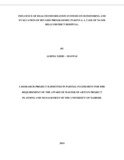| dc.description.abstract | Information gathered from Health Information Systems (HIS) is essential for monitoring health, and for evaluating and improving the delivery of health-care services and programmes. Yet health information systems in most countries and especially in developing countries are inadequately utilized for monitoring and evaluation of health programmes, particularly HIV/AIDS programmes. The purpose of this study was to determine influence of health information systems on monitoring and evaluation of HIV/AIDS programmes. Effective monitoring and evaluation of HIV/AIDS program allows the project team to make appropriate decisions on a day-to-day basis and ensures that the program is carried out as planned and modified when necessary. The purpose of monitoring and evaluation is to improve the HIV and AIDS programmes and the infrastructure for delivering them and to guide the allocation of resources in current and future programmes. It is in this context that the study sought to determine the influence health information systems on monitoring and evaluation of HIV/AIDS programmes. The study was guided by the following research objectives: to determine the influence of physical resource (hardware) on monitoring and evaluation of HIV/AIDS program, to establish the influence of stakeholder support (people) on monitoring and evaluation of HIV/AIDS program, to evaluate the influence of data on monitoring and evaluation of HIV/AIDS program, and to establish the influence of system support (software) on monitoring and evaluation of HIV/AIDS program. This study will be of help to the Ministry of Health especially the HIV/AIDS sector through a situational analysis of Health Information Systems on monitoring and evaluation of HIV/AIDS programmes. The study employed descriptive survey research design. The total target population consists of 193 respondents which include 16 HIV committee members and 177 health care workers of Nandi Hills District Hospital. The study used stratified sampling technique on the target population and selected a sample size of 137 respondents. The data was collected through questionnaires. Information collected from the respondents was coded for analysis. The raw data was analyzed using, Statistical Package for Social Sciences (S.P.S.S) and MS-Excel and the researcher used graphic presentation such as tables to present the data. The findings showed that 88.9% were of the opinion that acquisition of ICT resources facilitates access to the world’s medical knowledge that has locally-relevant content resources; 89.3% believed that building ICT infrastructure and systems in implementation of HIV/AIDS program will enable employees get the required skills and knowledge; 93.1% Data leads to autonomy of the monitoring and evaluation process; and 91.8% were of the opinion that System support provides the required operations support of the Heath Information System. It was concluded that the availability of ICT resources enables health systems to be alert, monitor and control the spread of HIV/AIDS, through the improvement of common information systems. The study also recommended that the management should facilitate availability and easy acquisition of resources to facilitate monitoring and evaluation. | en_US |

